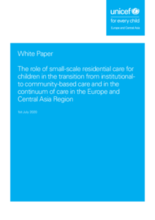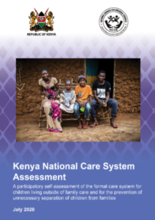Displaying 241 - 250 of 1510
Qualitative research based on a multiple‐case study was designed and carried out in Spain with the aim of deepening the understanding of the individual school experiences of three children in residential care.
This article reports on a study of children's experiences of being physically restrained by staff in a range of custodial settings, including Local Authority Secure Children's Homes, in the UK.
This preliminary scoping study aimed to explore approaches to family partnering within Australian therapeutic residential care (TRC), along with elements of best practice.
The objective of this study was to explore the effects of previous maltreatment on current self-representations (i.e., the attributes used to describe oneself) of youth in residential care and the moderating role of gender, age, number of previous placements and length of placement in residential care.
This article describes the psychosocial resilience processes that facilitate successful transitioning of young women as they journey out of residential care towards young adulthood.
This White Paper summarizes evidence on the current use and impact of small-scale residential care (also: ‘SSRC’) and offers guidance on how to enable all children to grow up in a loving and stable family environment. It aims to promote better decisionmaking among policy-makers, local governments, non-governmental organizations (NGOs), as well as child welfare and other, allied practitioners of the establishment.
This care system assessment is intended to support the Government of Kenya to assess and strengthen the national, formal care system.
In response to the continuing need for agencies providing residential care and treatment to children and youth to develop and/or to enhance their ability to examine the effectiveness and efficiency of their services, this article explores successful strategies for building and sustaining research capacity in these settings.
Employing a systematic scoping methodology, this review examined the scope and breadth of literature focusing on children and young people living in residential care in Australia who have experienced sexual exploitation.
In this commentary piece, Anne Longfield, Children’s Commissioner for England, explores the use of children's care homes in England and the need for improved supports to prevent placement in children's home and to provide for the needs of children and young people who are placed in these homes.


